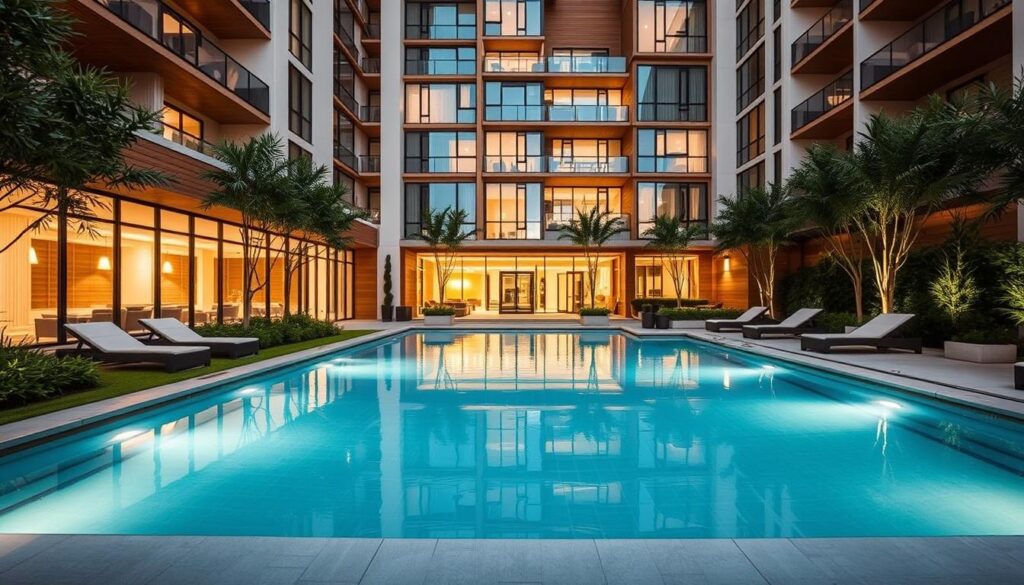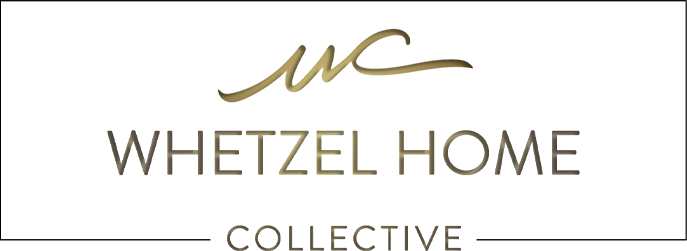Buying a condo in 2025 needs careful planning and expert advice. AtWhetzel Homes Collective, we get the complex real estate world. It makes buying a condo both thrilling and challenging.
The market today offers great chances for affordable housing with less upkeep. Median condo prices hit $359,800 in November 2024. This makes condos more accessible than single-family homes.
Condos are more than just places to live. They offer big benefits. With lower taxes and upkeep, they’re great for first-time buyers and investors. Our guide will cover all key steps in buying a condo.
Key Takeaways
- Median condo prices remain more affordable than single-family homes
- Urban locations offer prime condo investment opportunities
- Lower maintenance requirements attract diverse buyers
- HOA management provides additional property support
- Strategic purchasing can accelerate personal equity building
Understanding the 2025 Condo Market Landscape

The 2025 condo market is changing fast. It’s important for buyers and investors to know what’s happening. Recent data shows big changes in condo trends.
Condo and townhouse sales fell by 10.5% in 2024. This year, 94,380 units were sold. It shows the market is shifting.
Current Market Trends and Prices
The median price for condos and townhouses dropped to $320,000 in 2024. This is a 0.8% decrease from 2023. It shows the market is adjusting.
| Market Indicator | 2024 Data | Year-over-Year Change |
|---|---|---|
| Total Condo Sales | 94,380 units | -10.5% |
| Median Condo Prices | $320,000 | -0.8% |
| Inventory Supply | 8.2 months | Buyer’s Market |
Regional Market Analysis
The 2025 Florida real estate forecast is interesting. It shows:
- Emerging markets in the Florida Panhandle
- Growth in Fort Myers
- Promising developments along the Space Coast
Impact of Economic Factors
Vacation rental properties are becoming a good investment. They are in high demand in tourist areas. This could lead to steady income.
The forecast for 2025 is positive. It predicts a 4-6% increase in median home prices. This is good news for condo prices and market growth.
Financial Preparation for Condo Purchase

Getting ready to buy a condo needs careful planning. As a first-time buyer, knowing what you need financially is key. It makes the process easier and more successful.
There are a few important things to consider:
- Look at your income and expenses
- Check how much you can save for a down payment
- Understand how your credit score affects you
- Look into different ways to finance your condo
Your credit score is very important. Lenders want scores over 620 for regular loans. Start checking and improving your credit at least six months before you apply for a condo loan.
“Financial preparation is the cornerstone of a successful condo purchase” – Real Estate Investment Experts
How much you should save for a down payment depends on your situation. While 20% is common, you might be able to get a loan with just 3.5% down. Look at your savings and the loan options to find the best choice for you.
- Conventional loans: Need 5-20% down
- FHA loans: Only 3.5% down needed
- VA loans: No down payment for some veterans
How you spend your money matters a lot. Experts say you should not spend more than 30% of your income on housing. This includes your loan, HOA fees, and maintenance costs.
Managing your money well is important. Cut down on unnecessary spending, keep your income steady, and have all your financial documents ready. This will help you stand out as a strong condo buyer.
How to Buy a Condo: Essential Steps
Buying a condo needs careful planning and a smart approach. It’s important to break down the process into steps. This helps you make a well-informed choice.

Buying a condo involves many important stages. You need to prepare well and pay attention to details. Successful buyers follow a systematic approach. They make sure to cover all key aspects of their investment.
Pre-Purchase Checklist
- Evaluate your financial readiness
- Check credit score and report
- Save for down payment and closing costs
- Research possible neighborhoods
- Determine specific condo requirements
Documentation Requirements
Getting your documents ready is key in the condo buying process. You’ll need to collect certain financial documents.
| Document Type | Purpose |
|---|---|
| Tax Returns | Verify income stability |
| Bank Statements | Demonstrate financial capacity |
| Employment Verification | Confirm current income |
| Credit Report | Assess lending ability |
Timeline Expectations
Knowing the typical timeline helps you plan better. The whole process usually takes 3-6 months. It includes several key steps.
- Initial research and financial preparation (4-8 weeks)
- Property search and viewing (4-6 weeks)
- Making an offer and negotiation (2-4 weeks)
- Loan approval and documentation (3-5 weeks)
- Closing process (2-3 weeks)
Working with experienced real estate agents can make things easier. They help you avoid common problems and ensure a smooth transaction.
Determining Your Condo Budget

Creating a condo budget is more than just the initial cost. Buyers need to think about many financial details. This helps make a choice that fits your financial future.
When making your condo budget, consider these key points:
- Purchase price and down payment needs
- Monthly mortgage costs
- Homeowners Association (HOA) fees
- Property taxes
- Utility bills
- Possible special assessments
The average HOA fee in the U.S. is about $191 a month. But, this can change a lot based on what’s included and where it is. Condo buyers should plan for these ongoing costs.
Experts say to save at least 10% for unexpected expenses. This helps cover maintenance or repairs. Condos often share these costs, which can lower what you pay individually.
Pro tip: Check the condo association’s Resale Certificate. It shows the community’s financial health and any future costs.
Thinking about your mortgage is key in budgeting for a condo. Saving 20% for a down payment can help avoid extra insurance costs. It also gets you better loan terms.
| Budget Component | Estimated Percentage |
|---|---|
| Down Payment | 15-20% |
| Monthly HOA Fees | $150-$300 |
| Reserve Fund | 10% of total budget |
Good budget planning turns buying a condo into a smart investment. It’s not just a purchase; it’s a strategic move for your finances.
Exploring Financing Options and Mortgage Types
Looking into condo financing can be tough for buyers. It’s key to know the different condo mortgage types to choose wisely for your investment.

Finding the right mortgage is big for your financial future. Each loan type has its own benefits, based on your financial situation and goals.
Conventional Loan Strategies
Conventional loans are a top pick for condo buyers. They usually need:
- 3-5% down payment
- Minimum credit score of 620
- Stable income proof
Government-Backed Loan Options
Government loans offer condo financing for various financial situations:
| Loan Type | Down Payment | Credit Score |
|---|---|---|
| FHA Loans | 3.5% (580+ score) | 500-579 |
| VA Loans | 0% | Varies |
Interest Rates and Loan Terms
Interest rates play a big role in your financial planning. Fixed-rate mortgages give steady payments. Adjustable-rate mortgages might start with lower rates.
Tip: Always compare multiple lenders to find the best condo mortgage types for your specific needs.
Your credit score, down payment, and financial history will help pick the best financing for your condo.
Working with Real Estate Professionals

Buying a condo needs the help of real estate experts. They guide buyers through the process, helping them find the right condo. Their knowledge is key to making smart choices.
REALTORS® add a lot of value to the condo buying journey. They know the market well and support buyers every step of the way. They follow a strict Code of Ethics, ensuring deals are fair and transparent.
“A skilled real estate professional can transform a complex condo purchase into a smooth, confident journey.”
- Provide expert market insights and neighborhood analysis
- Access to the full MLS database
- Negotiate the best terms
- Handle complex legal papers
- Offer emotional support
Real estate pros have a wide network, finding special deals. They know the local market inside out. They help buyers see beyond the surface of properties.
| Professional Role | Key Responsibilities |
|---|---|
| Real Estate Agent | Property search, negotiations, market guidance |
| Mortgage Broker | Financing options, loan application support |
| Real Estate Lawyer | Contract review, legal documentation |
Working with seasoned real estate pros makes the condo buying process easier. They offer the guidance and support needed to move forward confidently.
Understanding Condo Association Rules and Fees

For new property owners, condo rules and regulations can be tricky to understand. Condo associations are key in managing shared spaces and keeping community standards high. They handle everything from upkeep of common areas to financial tasks.
Monthly Maintenance Costs
Condo maintenance fees are a big part of owning a condo that buyers need to know about. These fees, which range from $200 to $500 monthly, depend on the condo’s size and features. They cover important things like:
- Landscaping and exterior upkeep
- Insurance for common areas
- Shared utility costs
- Security services
- Keeping parking lots and walkways in good shape
“Understanding condo maintenance fees is essential for making an informed real estate investment.” – Real Estate Experts
Special Assessments
Special assessments are surprise costs that condo owners might face. These one-time fees happen when big repairs or upgrades are needed. Some examples include:
- Major structural repairs
- Recovering from natural disasters
- Urgent infrastructure updates
- Refilling emergency funds
Reserve Fund Requirements
The reserve fund is a financial cushion for condo associations. About 27% of this fund comes from monthly fees. A good reserve fund helps with:
- Long-term repairs and replacements
- Big system upgrades
- Emergency maintenance needs
Before buying a condo, it’s important to check the association’s financial health. Look at their reserve fund and budgeting to make a smart choice.
Location Selection Strategies

Choosing the right condo location is key when buying a condo. The best location can greatly affect your property’s value and your lifestyle. Smart buyers know that location is more than just an address. It’s about finding a strategic investment.
When looking at condo locations, consider these important factors:
- Neighborhood desirability and future growth
- Proximity to essential amenities
- Public transportation accessibility
- Local school district quality
- Crime rates and safety metrics
Cities with limited growth, like San Francisco, often have higher property values. Emerging neighborhoods with infrastructure improvements offer great investment chances. Properties near new infrastructure can see big value increases.
Rental demand and growth are key for condo locations. Areas with strong rental markets usually offer better returns. Properties near good schools, easy transportation, and diverse amenities attract more buyers and renters.
Remember: A strategic condo location balances current livability with future growth.
Understanding neighborhood dynamics is important for buyers. Look beyond today and think about future developments that could boost property values.
Evaluating Condo Amenities and Features
Choosing the right condo is more than just about size. Amenities and features can really make a difference in your life. They can even increase the condo’s value. Modern condos offer many advanced options for different lifestyles and tastes.

When looking at condo features, buyers should think about what makes a place special. These features can turn a simple space into something amazing.
Exploring Common Areas
Today’s condos have evolved to offer more than just a place to live. They have shared spaces that make living better and more connected.
- Rooftop decks with city views
- Modern co-working spaces
- Community lounges
- Green outdoor spaces
- Game rooms and social areas
Advanced Security Features
Security is a big concern for condo residents. Modern buildings use the latest tech to keep everyone safe and sound.
- Digital passcode entry systems
- 24/7 surveillance cameras
- Controlled access points
- Security personnel screening
Parking and Transportation Options
Parking is a key factor in choosing a condo. Modern condos offer various solutions for car owners and those who prefer public transport.
- Assigned parking spaces
- Underground secure parking
- Electric vehicle charging stations
- Bicycle storage facilities
“The right condo amenities can transform your living experience from ordinary to exceptional.” – Real Estate Insights 2025
When looking at condos, think about what’s there now and what might be added later. Each feature adds to the quality of life and can even increase the condo’s value.
The Inspection Process

A professional condo inspection is key when buying a condo. It lets buyers know the real state of their future home. It also spots issues before they spend a lot of money.
Inspectors check both the condo unit and shared spaces. They look at:
- Interior structural elements
- Electrical systems
- Plumbing functionality
- HVAC performance
- Safety features
They also check important parts like:
- Water damage risk
- Smoke alarm work
- Condition of windows and doors
- Electrical wiring
- Shared wall strength
The cost of a condo inspection is usually $500 to $750. This small cost can save a lot of money later. It also gives important info about the property.
Choosing the right inspector is important. Look for someone with:
- Licensed credentials
- Errors and Omissions Insurance
- Good professional references
- Lots of condo inspection experience
Ask for a detailed report after the inspection. This report can help in negotiations. Knowing about maintenance needs early helps make better investment choices.
Legal Considerations and Documentation
Buying a condo means diving into legal details. It’s key to know the condo rules to protect your investment and avoid future problems.
Several important legal documents need a close look when buying a condo:
- Covenants, Conditions, and Restrictions (CC&Rs)
- Homeowners Association (HOA) bylaws
- Financial statements
- Meeting minutes
- Insurance documentation
The Arizona Condominium Act is a must-read for condo owners. Owners get a share in common areas like pools and parking garages.
| Legal Document | Key Considerations |
|---|---|
| CC&Rs | Breaking these rules can lead to fines or lawsuits |
| HOA Bylaws | Learn about community rules and management |
| Reserve Funds | Should cover at least 25% of income for emergencies |
Getting help from a lawyer is very helpful. They can explain tricky parts, spot risks, and help you make a smart choice.
Expert tip: Always check the latest HOA meeting minutes to see how the community is doing and what challenges might come up.
Also, think about the condo’s financial health. Lenders want to see about 90% owner-occupancy. And, there might be rules about how many investors can own units.
Negotiation Strategies and Making Offers
Condo negotiation is all about strategy and knowing the market. It’s not just about finding a condo. It’s about making an offer that really stands out.

Negotiation in real estate is an art. It needs careful planning and smart execution. Buyers must think about more than just the price.
Price Negotiation Tips
- Do a comparative market analysis to know property values
- Use the anchoring technique by setting a clear reference point
- Be ready to make strategic concessions
- Practice active listening to understand seller motivations
Contingencies to Consider
- Home inspection contingency
- Financing contingency
- Appraisal contingency
- Sale of existing home contingency
Counter-Offer Handling
When you get a counter-offer, stay calm and focused. Your goal is to make a deal that works for both sides. Building trust with the seller or their agent is key.
The key to successful negotiation is understanding both parties’ underlying interests and finding creative solutions.
Good communication is essential. Work with your real estate agent to create a negotiation plan. This plan should fit your budget and what you want when buying a condo.
Closing Process and Final Steps

The condo closing process is the last step in buying a property. It’s important to know each part to make the transition smooth. Buyers should get ready for a detailed process that usually takes 30 to 60 days.
Key parts of the condo purchase guide include several important stages:
- Opening an escrow account to safely keep transaction funds
- Doing a detailed title search
- Getting title insurance for protection
- Looking over all legal papers
Closing costs are a big part of the condo closing process. These costs usually range from 2% to 7% of the purchase price. Buyers should plan for these costs and know what they cover.
The final walk-through is a key check. It lets buyers make sure the property is as agreed. They should check that all agreed repairs are done and the condo is up to standards.
At the closing meeting, buyers will:
- Sign many legal documents
- Pay any remaining closing costs
- Officially transfer ownership
- Get the keys to their new condo
It’s wise to hire a real estate attorney to check documents and talk about closing costs. Knowing what each document means helps protect your investment and makes the deal clear.
Final Thoughts on Purchasing a Condo in St. George, Utah in 2025
Buying a condo needs careful planning and smart choices. Knowing about condo ownership helps buyers make choices that fit their lifestyle and money goals. Each step, from looking at amenities to understanding HOA rules, requires careful thought.
Getting a condo right means doing your homework and getting advice from experts. Buyers should get their finances in order, check out the location, and think about the condo’s future value. Buying a condo is more than just a property; it’s finding a home that fits your needs and budget.
Are you ready to own a condo? Whetzel Homes Collective is here to help. Our team is ready to guide you through the condo buying process. Call us at (435) 334-1544 in St. George, Utah, to start your condo journey.
Knowledge is key in real estate. By knowing the market, financial needs, and what you want, you can make a wise condo investment. This investment will meet your current and future needs.
FAQ
What are the key financial considerations when buying a condo in 2025?
How do condo fees work, and what do they typically cover?
What are the key financial considerations when buying a condo in 2025?
How do condo fees work, and what do they typically cover?
FAQ
What are the key financial considerations when buying a condo in 2025?
When buying a condo in 2025, saving for a down payment is key. Aim for 10-20% of the purchase price. A strong credit score, over 700, is also important.
Understand the ongoing maintenance fees and budget for special assessments. Remember, the purchase price isn’t the only cost. Monthly HOA fees, property taxes, and utilities also matter.
How do condo fees work, and what do they typically cover?
Condo fees are monthly payments to the HOA. They cover shared maintenance, insurance, and upkeep of common areas. Fees range from 0 to
FAQ
What are the key financial considerations when buying a condo in 2025?
When buying a condo in 2025, saving for a down payment is key. Aim for 10-20% of the purchase price. A strong credit score, over 700, is also important.
Understand the ongoing maintenance fees and budget for special assessments. Remember, the purchase price isn’t the only cost. Monthly HOA fees, property taxes, and utilities also matter.
How do condo fees work, and what do they typically cover?
Condo fees are monthly payments to the HOA. They cover shared maintenance, insurance, and upkeep of common areas. Fees range from $200 to $1,000 monthly, based on amenities and location.
Always check the fee breakdown. Know what’s included and what’s not.
What financing options are available for condo purchases in 2025?
Buyers have several financing options. These include conventional loans, FHA loans, and VA loans for veterans. Conventional loans need higher credit scores, while FHA loans are more flexible.
Each loan has different down payment and mortgage insurance rules. It’s wise to compare lenders and get pre-approved to see your options.
What should I look for during a condo inspection?
A condo inspection should check the unit’s condition and the building’s common areas. Look at electrical systems, plumbing, and structural integrity. Also, check for water damage.
Review the building’s maintenance, recent repairs, and the reserve fund. Check for any pending maintenance issues that could cost more in the future.
How important is location when buying a condo?
Location is very important. Think about public transportation, amenities, and future development plans. Also, consider neighborhood safety and property value growth.
Research the area’s economy and infrastructure projects. A good location can improve your life and investment.
What legal documents should I review before purchasing a condo?
Review the condo declaration, bylaws, financial statements, and meeting minutes. Also, check the reserve fund status and current rules. These documents explain ownership, financial health, and any restrictions.
It’s a good idea to hire a real estate attorney to help with these documents.
What additional costs should I budget for beyond the purchase price?
Beyond the purchase price, budget for closing costs (2-5% of the purchase price). Also, consider monthly HOA fees, property taxes, insurance, and special assessments. Don’t forget moving expenses, furnishing costs, and a repair fund.
How do I evaluate condo amenities effectively?
When evaluating amenities, think about their value and impact on resale. Look beyond flashy features. Consider fitness centers, security, parking, and shared spaces.
Think about how these amenities fit your lifestyle. Do they justify the extra costs in HOA fees?
,000 monthly, based on amenities and location.
Always check the fee breakdown. Know what’s included and what’s not.
What financing options are available for condo purchases in 2025?
Buyers have several financing options. These include conventional loans, FHA loans, and VA loans for veterans. Conventional loans need higher credit scores, while FHA loans are more flexible.
Each loan has different down payment and mortgage insurance rules. It’s wise to compare lenders and get pre-approved to see your options.
What should I look for during a condo inspection?
A condo inspection should check the unit’s condition and the building’s common areas. Look at electrical systems, plumbing, and structural integrity. Also, check for water damage.
Review the building’s maintenance, recent repairs, and the reserve fund. Check for any pending maintenance issues that could cost more in the future.
How important is location when buying a condo?
Location is very important. Think about public transportation, amenities, and future development plans. Also, consider neighborhood safety and property value growth.
Research the area’s economy and infrastructure projects. A good location can improve your life and investment.
What legal documents should I review before purchasing a condo?
Review the condo declaration, bylaws, financial statements, and meeting minutes. Also, check the reserve fund status and current rules. These documents explain ownership, financial health, and any restrictions.
It’s a good idea to hire a real estate attorney to help with these documents.
What additional costs should I budget for beyond the purchase price?
Beyond the purchase price, budget for closing costs (2-5% of the purchase price). Also, consider monthly HOA fees, property taxes, insurance, and special assessments. Don’t forget moving expenses, furnishing costs, and a repair fund.
How do I evaluate condo amenities effectively?
When evaluating amenities, think about their value and impact on resale. Look beyond flashy features. Consider fitness centers, security, parking, and shared spaces.
Think about how these amenities fit your lifestyle. Do they justify the extra costs in HOA fees?
